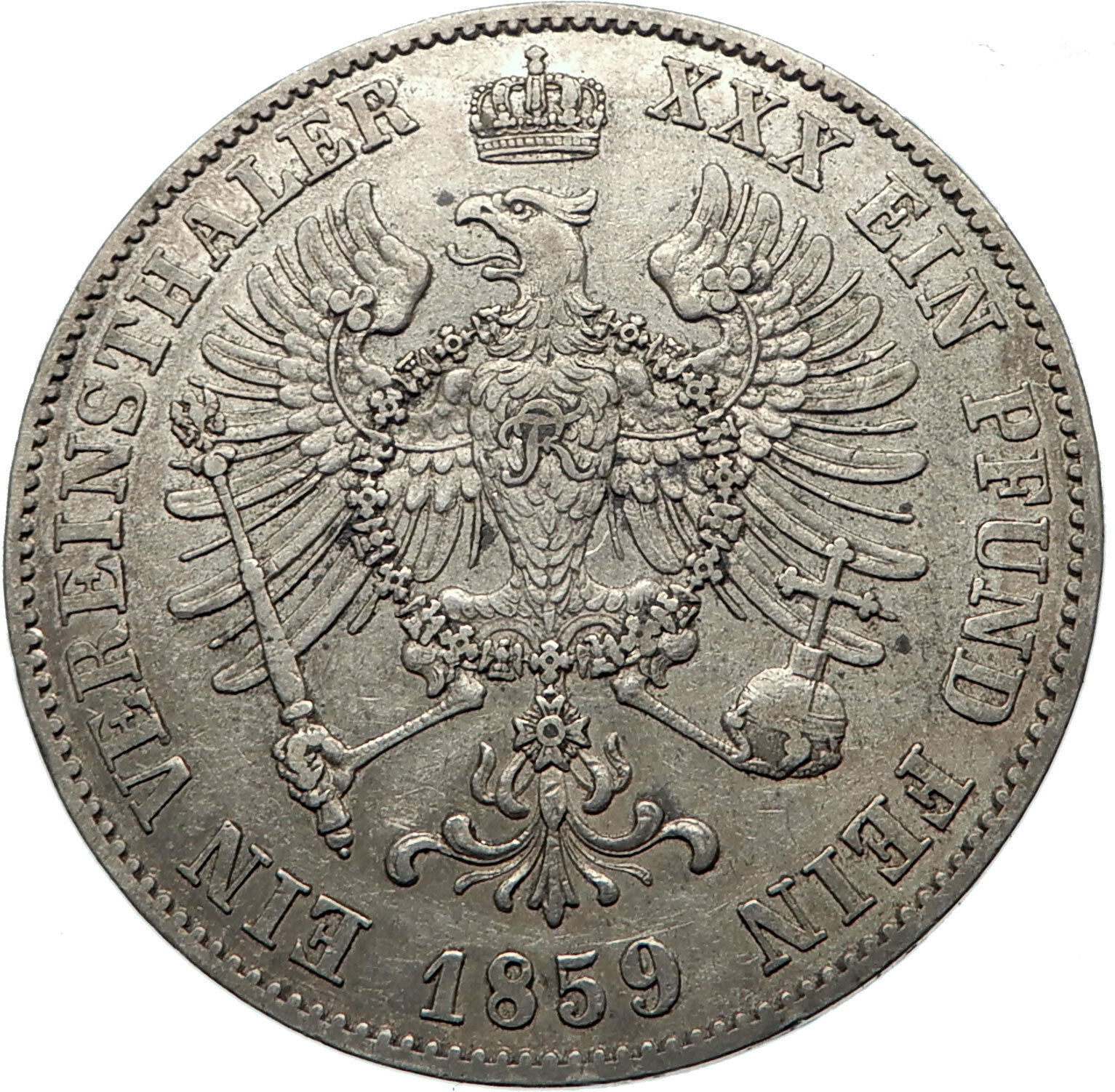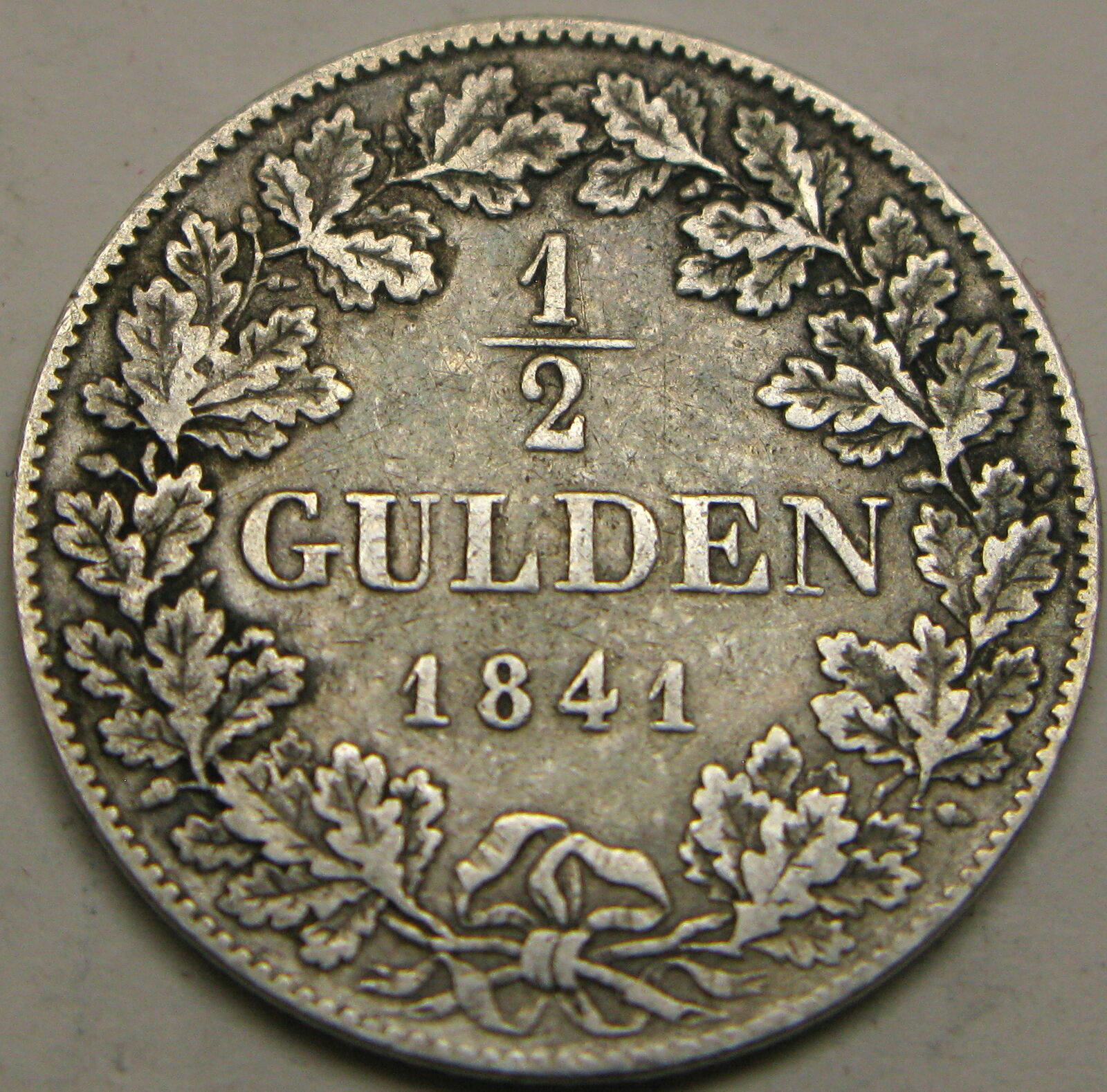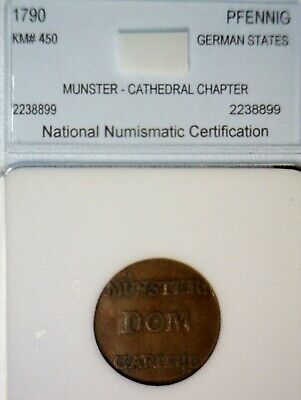-40%
1859 PRUSSIA King Friedrich Wilhelm IV GERMANY Silver German STATES Coin i73819
$ 189.44
- Description
- Size Guide
Description
Item:i73819
Authentic Coin of:
KINGDOM of PRUSSIA under
Germany
Friedrich Wilhelm IV
- King of Prussia: 7 June 1840 - 2 January 1861
1859
Silver 1 Thaler 33mm (
18.49
grams) 0.900 Silver (0.5359 oz. ASW)
Reference: KM# 471
FRIEDR. WILHELM IV KOENIG V. PREUSSEN A King facing right.
EIN VEREINSTHALER XXX EIN PFUND FEIN, Year below coat of arms.
Edge Lettering: GOTT MIT UNS
You are bidding on the exact item pictured, provided with a Certificate of Authenticity and Lifetime Guarantee of Authenticity.
Frederick William IV
(German:
Friedrich Wilhelm IV.
; 15 October 1795 - 2 January 1861), the eldest son and successor of Frederick William III of Prussia, reigned as King of Prussia from 1840 to 1861. Also referred to as the "romanticist on the throne", he is best remembered for the many buildings he had constructed in Berlin and Potsdam, as well as for the completion of the Gothic Cologne Cathedral. In politics, he was a conservative, and in 1849 rejected the title of Emperor of the Germans offered by the Frankfurt Parliament as not the Parliament's to give. In 1857, he suffered a stroke and was left incapacitated until his death.
Early life
Born to Frederick William III by his wife Queen Louise, he was the latter's favourite son. Frederick William was educated by private tutors, many of whom were experienced civil servants, such as Friedrich Ancillon. He also gained military experience by serving in the Prussian Army during the War of Liberation against Napoleon in 1814, although he was an indifferent soldier. He was a draftsman interested in both architecture and landscape gardening and was a patron of several great German artists, including architect Karl Friedrich Schinkel and composer Felix Mendelssohn. In 1823 he married Elisabeth Ludovika of Bavaria. Since she was a Roman Catholic, the preparations for this marriage included difficult negotiations which ended with her conversion to Lutheranism. There were two wedding ceremonies-one in Munich, and another in Berlin. The couple had a very harmonious marriage, but it remained childless.
Frederick William was a staunch Romanticist, and his devotion to this movement, which in the German States featured nostalgia for the Middle Ages, was largely responsible for his developing into a conservative at an early age. In 1815, when he was only twenty, the crown prince exerted his influence to structure the proposed new constitution of 1815, which was never actually enacted, in such a way that the landed aristocracy would hold the greatest power. He was firmly against the liberalization of Germany and only aspired to unify its many states within what he viewed as a historically legitimate framework, inspired by the ancient laws and customs of the recently dissolved Holy Roman Empire. Frederick William opposed the idea of a unified German state, believing that Austria was divinely ordained to rule over Germany,
[
citation needed
]
and contented himself with the title of "Grand General of the Realm".
Reign
Frederick William became King of Prussia on the death of his father in 1840. Through a personal union, he also became the sovereign prince of the Principality of Neuchâtel (1840-1857), today part of Switzerland. In 1842, he gave his father's menagerie at Pfaueninsel to the new Berlin Zoo, which opened its gates in 1844 as the first of its kind in Germany. Other projects during his reign-often involving his close collaboration with the architects-included the
Alte Nationalgalerie
(Old National Gallery) and the
Neues Museum
in Berlin, the
Orangerieschloss
at Potsdam as well as the reconstruction of Schloss Stolzenfels on the Rhine (Prussian since 1815) and Burg Hohenzollern, in the ancestral homelands of the dynasty which became part of Prussia in 1850.
Although a staunch conservative, Frederick William did not seek to be a despot, and so he toned down the reactionary policies pursued by his father, easing press censorship and promising to enact a constitution at some point, but he refused to create an elected legislative assembly, preferring to work with the nobility through "united committees" of the provincial estates. Despite being a devout Lutheran, his Romantic leanings led him to settle the Cologne church conflict by releasing the imprisoned Clemens August von Droste-Vischering, the Archbishop of Cologne. He also patronized further construction of Cologne Cathedral, Cologne having become part of Prussia in 1815. In 1844, he attended the celebrations marking the completion of the cathedral, becoming the first King of Prussia to enter a Roman Catholic house of worship. When he finally called a national assembly in 1847, it was not a representative body, but rather a United Diet comprising all the provincial estates, which had the right to levy taxes and take out loans, but no right to meet at regular intervals.
When revolution broke out in Prussia in March 1848, part of the larger series of Revolutions of 1848, the king initially moved to repress it with the army, but on 19 March he decided to recall the troops and place himself at the head of the movement. He committed himself to German unification, formed a liberal government, convened a national assembly, and ordered that a constitution be drawn up. Once his position was more secure again, however, he quickly had the army reoccupy Berlin and in December dissolved the assembly. He did, however, remain dedicated to unification for a time, leading the Frankfurt Parliament to offer him the crown of Germany on 3 April 1849, which he refused, purportedly saying that he would not accept "a crown from the gutter". The King's refusal was rooted in his Romantic aspiration to re-establish the medieval Holy Roman Empire, comprising smaller, semi-sovereign monarchies under the limited authority of a Habsburg emperor. Therefore, Frederick William would only accept the imperial crown after being elected by the German princes, as per the former empire's ancient customs. He expressed this sentiment in a letter to his sister the Empress Alexandra Feodorovna of Russia, in which he said the Frankfurt Parliament had overlooked that "in order to give, you would first of all have to be in possession of something that can be given."
[6]
In the king's eyes, only a reconstituted College of Electors could possess such authority. With the failed attempt by the Frankfurt Parliament to include the Habsburgs in a newly unified German Empire, the Parliament turned to Prussia. Seeing Austrian ambivalence towards Prussia taking a more powerful role in German affairs, Frederick William began considering a Prussian-led union. All German states, excluding those of the Habsburgs, would be unified under Hohenzollern authority, and these two polities would be linked in an overarching political framework. Frederick William, therefore, did attempt to establish the Erfurt Union, a union of the German states except for Austria, but abandoned the idea by the Punctation of Olmütz on 29 November 1850, in the face of renewed Austrian and Russian resistance. The German Confederation remained the common government of German Europe.
Rather than returning to bureaucratic rule after dismissing the Prussian National Assembly, Frederick William promulgated a new constitution that created a Parliament of Prussia with two chambers, an aristocratic upper house and an elected lower house. The lower house was elected by all taxpayers, but in a three-tiered system based on the amount of taxes paid, so that true universal suffrage was denied. The constitution also reserved to the king the power of appointing all ministers, re-established the conservative district assemblies and provincial diets, and guaranteed that the civil service and the military remained firmly under control of the king. This was a more liberal system than had existed in Prussia before 1848, but it was still a conservative system of government in which the monarch, the aristocracy, and the military retained most of the power. This constitution remained in effect until the dissolution of the Prussian kingdom in 1918.
Germany
, officially the
Federal Republic of
Germany
is a federal parliamentary republic in western-central Europe. It includes 16 constituent states and covers an area of 357,021 square kilometres (137,847 sq mi) with a largely temperate seasonal climate. Its capital and largest city is Berlin. With 81 million inhabitants, Germany is the most populous member state in the European Union. After the United States, it is the second most popular migration destination in the world.
Various Germanic tribes have occupied northern Germany since classical antiquity. A region named Germania was documented before 100 CE. During the Migration Period the Germanic tribes expanded southward. Beginning in the 10th century, German territories formed a central part of the Holy Roman Empire. During the 16th century, northern German regions became the centre of the Protestant Reformation.
The rise of Pan-Germanism inside the German Confederation resulted in the unification of most of the German states in 1871 into the Prussian-dominated German Empire. After World War I and the German Revolution of 1918-1919, the Empire was replaced by the parliamentary Weimar Republic. The establishment of the Third Reich in 1933 led to World War II and the Holocaust. After 1945, Germany split into two states, East Germany and West Germany. In 1990, the country was reunified.
In the 21st century, Germany is a great power and has the world's fourth-largest economy by nominal GDP, as well as the fifth-largest by PPP. As a global leader in several industrial and technological sectors, it is both the world's third-largest exporter and importer of goods. Germany is a developed country with a very high standard of living sustained by a skilled and productive society. It upholds a social security and universal health care system, environmental protection and a tuition free university education.
Germany was a founding member of the European Union in 1993. It is part of the Schengen Area, and became a co-founder of the Eurozone in 1999. Germany is a member of the United Nations, NATO, the G8, the G20, and the OECD. The national military expenditure is the 9th highest in the world. Known for its rich cultural history, Germany has been continuously the home of influential artists, philosophers, musicians, sportsmen, entrepreneurs, scientists and inventors.
Frequently Asked Questions
Mr. Ilya Zlobin
, world-renowned expert numismatist, enthusiast, author and dealer in authentic ancient Greek, ancient Roman, ancient Byzantine, world coins & more.
Who am I dealing with?
You are dealing with Ilya Zlobin, ancient coin expert, enthusiast, author and dealer with an online store having a selection of over 15,000 items with great positive feedback from verified buyers and over 10 years experience dealing with over 57,000 ancient and world coins and artifacts. Ilya Zlobin is an independent individual who has a passion for coin collecting, research and understanding the importance of the historical context and significance all coins and objects represent. Most others are only concerned with selling you, Ilya Zlobin is most interested in educating you on the subject, and providing the largest selection, most professional presentation and service for the best long-term value for collectors worldwide creating returning patrons sharing in the passion of ancient and world coin collecting for a lifetime.
How long until my order is shipped?
Orders are shipped by the next business day (after receipt of payment) most of the time.
How will I know when the order was shipped?
After your order has shipped, you will be left positive feedback, and that date could be used as a basis of estimating an arrival date. Any tracking number would be found under your 'Purchase history' tab.
USPS First Class mail takes about 3-5 business days to arrive in the U.S. International shipping times cannot be estimated as they vary from country to country.
Standard international mail to many countries
does not
include a tracking number, and can also be slow sometimes.
For a tracking number and signature confirmation, you may want to do Express Mail International Shipping, which costs more, however, is the fastest and most secure. Additionally you may be able to receive your order in as little as 3-5 business days using this method. For Express Mail International, it may be possible to place up to 10-15 items in one package (for the one shipping cost) as it is flat rate envelope, which may be the most cost-effective, secure and fastest way to receive items internationally. Send me a message about this and I can update your invoice should you want this method.
Getting your order to you, quickly and securely is a top priority and is taken seriously here.
Great care is taken in packaging and mailing every item securely and quickly.
Please be aware, I cannot take responsibility for any postal service delivery delays, especially for international packages as it may happen in rare instances.
What is a certificate of authenticity and what guarantees do you give that the item is authentic?
Each of the items sold here, is provided with a Certificate of Authenticity, and a Lifetime Guarantee of Authenticity, issued by a world-renowned numismatic and antique expert that has identified over 57,000 ancient coins and has provided them with the same guarantee. You will be very happy with what you get with the COA; a professional presentation of the coin, with all of the relevant information and a picture of the coin you saw in the listing. Additionally, the coin is inside it's own protective coin flip (holder), with a 2x2 inch description of the coin matching the individual number on the COA.
On the free-market such a presentation alone, can be considered a - value all in itself, and it comes standard with your purchases from me,
FREE.
With every purchase, you are leveraging my many years of experience to get a more complete context and understanding of the piece of history you are getting. Whether your goal is to collect or give the item as a gift, coins presented like this could be more prized and valued higher than items that were not given such care and attention to.
Buy a coin today and own a piece of history, guaranteed.
Is there a money back guarantee?
I offer a 30 day unconditional money back guarantee. I stand behind my coins and would be willing to exchange your order for either store credit towards other coins, or refund, minus shipping expenses, within 30 days from the receipt of your order. My goal is to have the returning customers for a lifetime, and I am so sure in my coins, their authenticity, numismatic value and beauty, I can offer such a guarantee.
When should I leave feedback?
Once you receive your order, please leave a positive feedback. Please don't leave any negative feedbacks, as it happens sometimes that people rush to leave feedback before letting sufficient time for their order to arrive. Also, if you sent an email, make sure to check for my reply in your messages before claiming that you didn't receive a response. The matter of fact is that any issues can be resolved, as reputation is most important to me. My goal is to provide superior products and quality of service.
How and where do I learn more about collecting ancient coins?
Visit the "
Guide on How to Use My Store
" for on an overview about using my store, with additional information and links to all other parts of my store which may include educational information on topics you are looking for.











